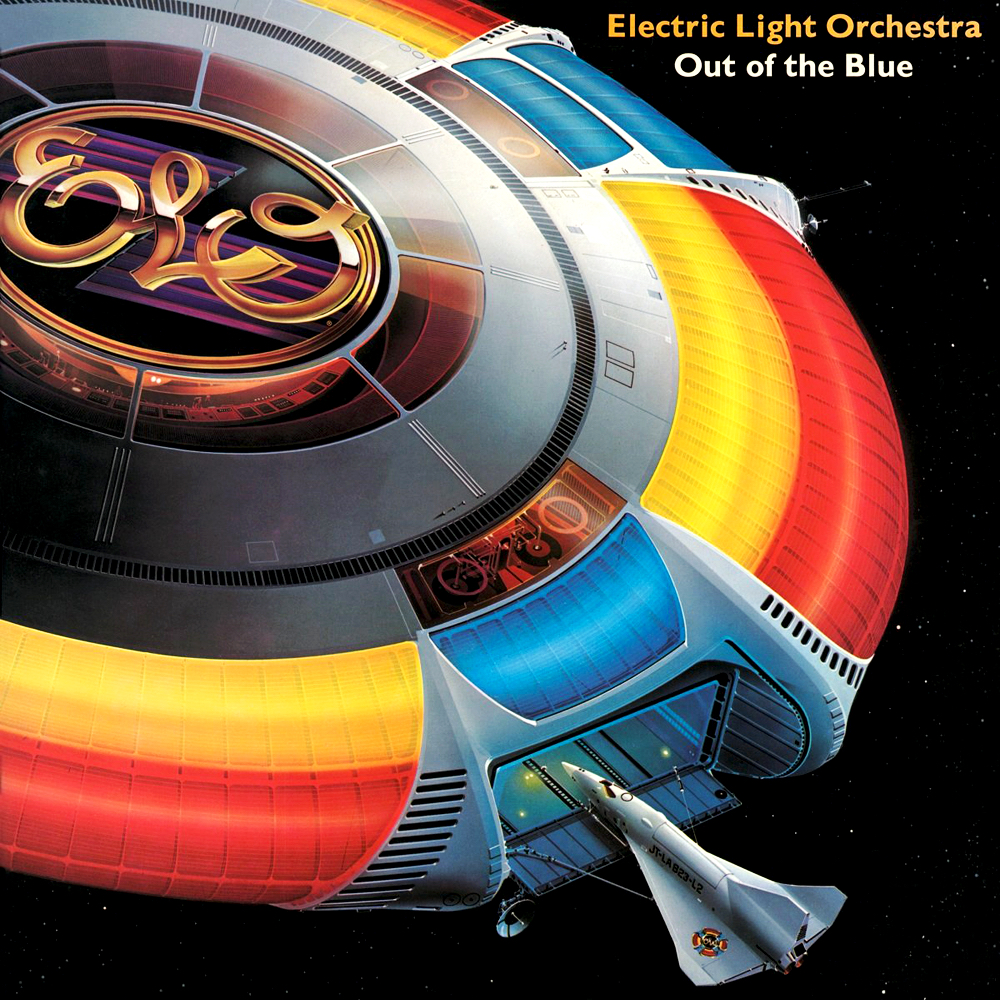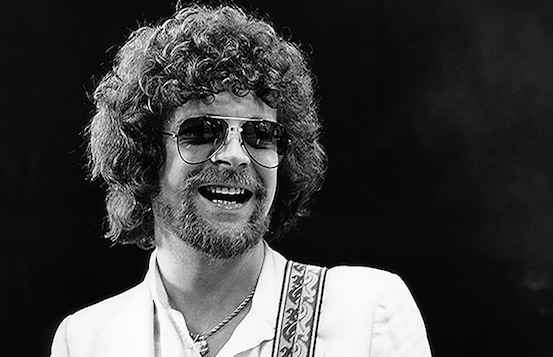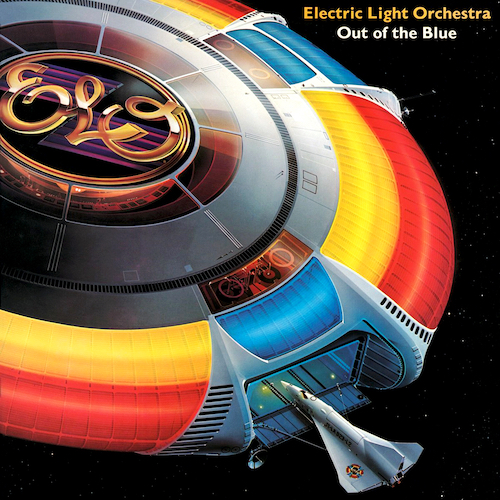
The saga of Electric Light Orchestra’s massively successful double-LP Out of the Blue (over 10 million albums sold, spawning four hit singles and a hugely popular world tour), began in early 1977 Los Angeles. The head of United Artists Records told ELO leader Jeff Lynne he wanted him to deliver a double live album in the mold of Frampton Comes Alive! as ELO’s follow-up to their latest album, A New World Record. Lynne liked the challenge of producing a new two-disc set as long as he could record it in the studio, and his boss gave him the go-ahead, but it had to be done fast.
Lynne found that tight deadlines motivated him, and he actually liked “chaining himself to a desk” to write lyrics, which he tended to do only after being satisfied with the music he’d create. “Out of the Blue was probably the hardest work I’ve ever done,” Lynne later wrote, “But also the most satisfying. It was a time of total music for me, and once I’d got rolling, the songs just kept on coming. Total music, and probably most of the beer gardens in Munich, just by way of distraction.”
Before heading to Munich, where he intended to record the album at Giorgio Moroder’s Musicland Studios in May, Lynne rented a chalet in the village of Bassin, just beyond Lake Geneva in the Swiss Alps. He brought his guitar, and hired a Revox tape recorder and electric piano from a little shop. “For two weeks, I came up with nothing, and I only had four weeks to write this double album! I was sort of thinking, bloody hell, maybe I can’t come up with anything. The weather had been really bad and then one day I got up and it was fantastic, the sun was brilliant and shining, all the mountains were lit up and this mist had gone away. It was gorgeous, and I came up with ‘Mr. Blue Sky.’ I just kept coming up with songs…about 14 in two weeks.”
Related: The inside history of ELO
Drummer Bev Bevan, who had been Lynne’s partner-in-crime ever since their days with the Move, told journalist Johnny Black in 2014, “Jeff had every song for that album on tape. As usual, he had done it with a piano, guitar and by humming the tune. We always built up an album in the same way: drums and bass first, then piano, followed by rhythm guitar. Electronic keyboards would come next, finishing with guitar solos.” Sometimes Bevan would meticulously double his drum parts, getting the “big, heavy, powerful” sound he was known for. Only after instrumental tracks were complete would lyrics be written and sung.

Having gathered his troops in Munich, Lynne began sessions on May 22, with house engineer Reinhold Mack running the board. As Mack told Johnny Black, Lynne often drove him crazy: “He’d say, ‘Can you get a big piano sound?’ After I tried my best to do that, he’d then say, ‘OK, that’s really good. Now can you screw it up?’ ‘What’s the point of doing this?’ I’d ask. ‘I could have screwed it up in the first place!” Still, Mack said they got along well enough during the arduous three months they worked together, especially if Lynne had enough German beer in him.
The other participants included Richard Tandy (playing nearly a dozen different keyboards, including Wurlitzer electric piano, Hohner clavinet and ARP Omni synthesizer), Kelly Groucutt on bass, Mik Kaminski on violin, and on cellos (a key part of the ELO sound) Hugh McDowell and Melvyn Gale. Lynne also played keyboards and a variety of electric Gibson and acoustic Ovation guitars. Lynne and Tandy wrote the orchestral and choral arrangements along with conductor Louis Clark. After a disastrous overdubbing session at a large soundstage at Munich’s Bavaria Film Studio, Mack somehow crammed a 54-piece string section into Musicland, with a 32-voice choir doing their parts in the building lobby.
One of the most distinctive elements on Out of the Blue is the Vocoder 2000 synthesizer, which filters the human voice into robotic form. Lynne says a prototype was obtained from the Stuttgart factory: “There was no manual, it was that new. We spent a whole day just getting it to do something, but once we got it going it was beautiful…that was a treat, you always want to innovate and get ahead with technology.”
Out of the Blue, released on Oct. 3, 1977, is full of ELO treasures, too many to detail all of them here. The album fades in with the propulsive “Turn to Stone,” the set’s first Billboard top 20 hit single. Awash in stacked vocals and synthesizers (Lynne plays the Moog bassline), it’s cinematic in reach, the swirling string section punctuating beautifully.
The second hit single (#17 in Billboard), “Sweet Talkin’ Woman,” starts with a baroque string quartet before yielding to one of Lynne’s most enticing melodies at a bracing, lilting dance tempo. The background vocals hint strongly at doo-wop and the Beach Boys, and Lynne’s falsetto on the chorus recalls both Smokey Robinson and Barry Gibb. It’s a miracle of pop production that obviously took many hours to construct, with the indulgence of Musicland’s neighbors.
In between those two blockbuster hits is “It’s Over,” which was the album’s fourth single (it peaked at #75). It’s a delicate mid-tempo ballad, more conventional than Lynne’s other work, seemingly based in early ’60s (pre-Beatles) songwriting style, especially that of Roy Orbison, who of course has a song with the same title. It’s well recorded and performed, but it’s no wonder it failed to chart higher during a period when AM radio was increasingly featuring the likes of Donna Summer, K.C. & the Sunshine Band and the Commodores.
The third side of the LP set is dedicated to the four-part “Concerto for a Rainy Day,” composed by Lynne from the very literal details of the weather in Bassin, ending with the epic five-minute “Mr. Blue Sky,” one of ELO’s most Beatlesque performances. Lynne sings like both Paul and John, and his smooth guitar solo nods to George. It is quintessential ELO, with huffing cellos, sound effects, tempo changes, multiple vocal lines (including that Mack-corralled choir), prominent Vocoder and lyrics that reinforce the absolute joy of the sun coming out. (Additional trivia: During the first part of the suite, “Standin’ In the Rain,” strings spell out E-L-O in Morse Code, and “Mr. Blue Sky” ends with the Vocoder saying “please turn me over” to point toward the concluding side four.)
The album’s last track, “Wild West Hero,” went top 10 in England and Ireland as a single (without getting a U.S. 45 rpm release). It goes through so many changes, it’s like a “pocket symphony” worthy of Brian Wilson. No wonder Lynne found it impressive enough to finish his dazzling 17-song creation. The chorus is based on Pachelbel’s “Canon,” with its stately melodic steps. It’s one of Lynne’s most gorgeous, melancholy tunes, until it goes briefly into a honky-tonk break at 1:40, with Melvyn Gale on piano. After more sweetly sung angst, at 2:43 it goes into a terrific a cappella choral verse, before Aaron Copland-esque strings swoop in, and then a Chuck Berry section begins, like a momentary reprise of ELO’s early breakout hit “Roll Over Beethoven.”
There’s plenty more to admire on Out of the Blue, including the Motown homage “Starlight” and mutant rocker “Birmingham Blues,” which quotes from ELO’s “Showdown” while paying tribute to their U.K. hometown, but everyone deserves to explore this masterpiece on their own. CD reissues include the rare and quite interesting single “Latitude 88 North,” a sort of Beach Boys pastiche that was a bona fide hit only in Iceland.
Bev Bevan, with the agreement of peripatetic jack-of-all-musical-trades Lynne, controlled the ELO franchise from 1989-1999, but Lynne reclaimed the band name with new personnel in 2000 after helming the Traveling Wilburys and many other productions. Lynne, Tandy, Bevan and ELO co-founder Roy Wood were confirmed as members of the Rock and Roll Hall of Fame (class of 2017), and Jeff Lynne’s ELO released their 14th album, From Out of Nowhere, in late 2019. Soon after, ELO canceled tour plans due to the Covid-19 pandemic, but don’t count them out. Jeff Lynne is not the retiring type.
Watch ELO perform “Turn to Stone” in 1977
Related: Links to 100s of current classic rock tours
- Patti Smith’s ‘Horses’: Poetry In Motion - 05/21/2024
- Elton John ‘Honky Chateau’: New Heights - 05/19/2024
- Paul Simon ‘There Goes Rhymin’ Simon’: American Tunes - 05/05/2024


18 Comments
Great album!
Great band!
Agreed!!!!!!! Sweet is the night is awesome!
Nice article, but one correction for you: Drummer Bev Bevan never had full control of the ELO brand. After Roy Wood left, both Bev and Jeff Lynne had 50% ownership stakes. Jeff eventually bought out Bev’s interest. Since Jeff wrote all but a of couple songs recorded by the band, music ownership has never been in question.
Jeff Lynne is such an amazing musician. I’m awestruck by the caliber of this music and the fact that he wrote all of the songs from “Out of the Blue” in two weeks. My favorite ELO song is from “Out of the Blue”; Evil Woman. I hate to sound like an old fuddy-duddy, but this is true, innovative music; unlike most of the music these days.
Evil Woman is not on Out Of The Blue. Best ELO song is Jungle from Out Of The Blue
EVIL WOMAN is one my favorite songs also. But I’ve never seen a ELO song I didn’t like.
Awesome Album. Liked all the songs, but my favorite was Summer and Lightening. That change up in the middle is so beautifully sweet. Those changes in melody and chorus on songs like Sweet Talking Woman and Telephone Lines always moved me.
Agreed! Also, Sweet is the night, which is my all time fave!
Turn to stone em 1977
Magníficos
Fantastic album. Side 3 is a must listen to, and should be regarded as a single peice, much like the Moody Blues album ‘Future Days Passed’ Was fortunate enough to be at the ‘Wembley or Bust’ concert in 2017, and one clever little nod to the album was that on stage was a huge replica of the little cardboard spaceship on a pylon that came free with the album. The one on stage went together much better than my cardboard one i must say!
A great band, I grew up in Birmingham when ELO was at their peak, I eventually worked in a cafe bar Hawkins on Corporation street Jeff Lynne and Roy Wood often pop in to have lunch together. They was so down to earth. Legends
Correction. Louis Clark wrote all the string arrangements not Jeff Lynn.
Jeff wrote the string parts on piano. Jeff, Richard Tandy and Louis Clark arranged the strings and Louis transcribed the parts for the classical musicians.
Thank you for this article. Out of the Blue has always been an under-appreciated classic to me. It’s locked in a three-way tie with Billy Joel’s ‘the Stranger’ and Meat Loaf’s ‘Bat Out of Hell’ as my favorite album of all time. OOTB is just an amazing LP and I’m glad to see it’s finally getting it’s due! And yes, Jeff Lynne is amazing! Like this album.
Have loved this album from it’s release. Always wondered if it’s title is due to influence from Gershwin’s Rhapsody in Blue. Many of the piano runs sound so similar and the beginning of “Night in the City” reminds one of “An American in Paris”. But I have never seen this confirmed anywhere.
Yes awesome album shame what followed was so disappointing with Discovery and Xanadu. I prefer ELOs more prog output than their pop singles. It’s a shame a lot of this gets overlooked in favour of songs like Evil Woman, which was only written as a stocking filler. Time was a fantastic come back. ELO are one of my favourite prog bands along with Genesis and Pink Floyd but they sold out to the pop market so sadly only. A few will ever hear the fabulous Kuiama.
Let me speak to Discovery. That album was disappointing to me as well when it came out. It is an album that will grow on you after time. I’m 65 now and I love that album. Thought I never would. It’s not that it took 40+ years for me to actually grow to like it. I picked it up again one day and listened to it. I just heard it totally differently than I ever had before. Xanadu was just a totally different animal, written for a movie, and a not very good movie at that. Did like ELO compositions on the album though. While I’m at it, you will be doing yourself a favor if you purchase Jeff Lynne’s 2 solo albums. If you haven’t heard them, get them sound unheard. You will thank me later. You’re welcome! Have a blessed day.
I know that it has been erroneously stated by lots of ignorant biographers that Hugh McDowell didn’t play on “Out of the Blue” at all, but in reality, this is not the case: when Melvyn Gale himself was directly asked by Martin Kinch as to whether he and Hugh were actually playing cellos on the three albums that involved them, he replied, “Of course we are.”
I’m glad that this article confirms that they and violinist Mik Kaminski were involved and to be honest, I just don’t get where this “ELO’s string players never played on their records” nonsense came from.
It is true that at times, the three string players were mixed in with the orchestra, so that might explain why this misconception came about as well.